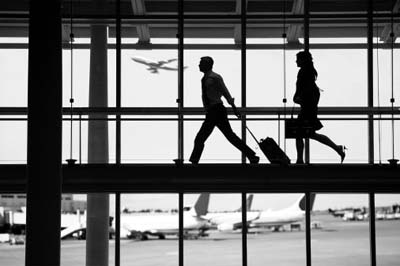Feb 05, 2026
Feb 05, 2026
 Long delays and canceled flights ... traffic jams ... inclement weather ... crowds ... all these factors and more can make traveling during the hectic holiday season a nightmare for many people. Yet, getting together with friends and family is part of what makes the holiday season so special.
Long delays and canceled flights ... traffic jams ... inclement weather ... crowds ... all these factors and more can make traveling during the hectic holiday season a nightmare for many people. Yet, getting together with friends and family is part of what makes the holiday season so special.
It's possible to travel stress-free. Once you understand what imbalances are caused in your physiology by travel, you can take steps to protect yourself and prevent the imbalances from developing. Ayurveda, the 5000-year-old science of healing from India, offers practical ways to travel without stress.
Imbalances Caused by Travel
Vata dosha, the Ayurvedic principle that governs movement in the physiology, tends to get disturbed during travel. In particular, continuous sitting disturbs Apana Vata, which controls the downward movements of elimination and purification. Traveling in fast-moving vehicles and an unpredictable routine aggravates Prana Vata, which controls mental and emotional balance. Pachaka Pitta, responsible for digestion, can also get disrupted by an irregular schedule of meals and sleep.
Steps to Stay Balanced
These practical suggestions can help you maintain your physical, mental and emotional equilibrium through travel and hectic times:
Before Travel
(for at least a week before departure)
Be meticulous about adhering to a regular routine. Taking pains to keep Vata in balance before you begin your journey will help you withstand stress, time pressure, multiple demands and unpredictability better. This means eating your meals at about the same times each day, with lunch being around noon and dinner about 3 hours before you go to bed. It means going to bed by 10:00 p.m. and getting an adequate amount of sleep. It means planning tasks in advance so you are hurrying around less.
Eat Vata and Pitta pacifying meals. Sweet lassi is an excellent lunchtime beverage. Avoid extremely sour foods such as pickles and vinegar and very spicy foods such as cayenne or hot chili peppers. Eat plenty of sweet juicy fruits, warm milk blended with rose petal preserve, light proteins such as mung beans.
Do a daily self-massage with an herbal or aroma massage oil. Massage helps boost circulation, enhances mind/body coordination, keeps the skin lubricated and tones muscles. The aches and pains and minor stiffness from sitting for long hours in cramped places that tend to crop up during travel will be minimized, and your resilience and energy levels during and after travel will be higher.
A scalp and head massage at least three times a week can be very helpful. Use a light oil such as almond or coconut. Gently warm a couple of teaspoons of the oil. Persons with longer hair may need more, to cover all the hair as well as the scalp. The oil should be warm enough to be soothing, not uncomfortably hot. Pour the oil on your palm and apply it evenly all over the scalp and the back of the neck close to the hairline. Using your fingertips, gently massage the oil into the scalp, working the oil in for about 4-5 minutes. Ideally the oil should be left on overnight (use a shower cap to protect your bed-linens) and shampooed off the next morning. If leaving it on overnight is impractical for you, leave it on for 2-3 hours, then shampoo your hair well to rinse it off.
Take vitality-enhancing herbs such as the Amalaki (Indian Gooseberry). Rejuvenative herbs have the ability to boost natural immunity, increase resilience to day-to-day stress and build energy levels. You'll stay fighting fit even if the people sitting around you have fallen prey to the latest bug floating around.
Eat cooked prunes and figs at breakfast to ensure regular elimination. The build-up of toxic matter (ama) in the physiology is what leads to disorders. Make sure that wastes are regularly flushed from the system.
During Travel
Drink a relaxing herbal tea, or sip plain water at the resort or hotel. Avoid carbonated or ice-cold beverages, because they disrupt digestion. Avoid caffeine and alcohol. Eat fresh fruit and light, easy-to-digest foods. These will help keep Vata and Pitta in balance. Avoid "junk" foods or heavy, hard-to-digest foods.
Listen to soothing music or meditate. Diffuse a relaxing aroma through a personal diffuser or aroma locket to help keep Vata dosha in balance. If you feel nausea, eat some fresh ginger or add some fresh ginger to warm water and sip on it. Research has shown that ginger can help prevent motion sickness.
After travel
Drink lots of warm water through the day to replenish moisture levels and assist in cleansing the channels of the body. Eat light yet nourishing foods such as mung bean soup for a few days to allow your digestion to adjust. Continue to drink herbal tea, two or three cups a day.
A daily massage will enhance circulation and calm the mind and nervous system.
Finally, catch up on rest.
Disclaimer:
Information provided in this article is for the sole purpose of imparting education on Ayurveda and is not intended to diagnose, treat, cure or prevent any disease. If you have a medical condition, please consult your physician.
05-Nov-2002
More by : Vasu Nargundkar